Dear Zazie,
Here is today’s Lovers’ Chronicle from Mac Tag.
Rhett
The Lovers’ Chronicle
Dear Muse,
these random thoughts
-a knock on the door-
i did place an order
but i did not think
anyone was listenin’
need some help
no, though i will
accept it from you
i like to do things
when inspired so
darlin’,
-pausin’-
if i were to…
with pleasure
i like this game
shall we play another
© copyright 2021 mac tag/cowboycoleridge all rights reserved
© copyright 2020 mac tag/cowboy coleridge all rights reserved
your own way of doin’ all you do, and any description fails in givin’ the full impression
you remind me of no one, so natural and quick to understand, to be, that i fell at once
will you consider a question, wonderin’ if you would join me in gettin’ up now and goin’ back
© copyright 2019 mac tag/cowboy coleridge all rights reserved
*Think on your sins*
-a knock on the door-
“Room service.”
i did not
order anything
-openin’ the door-
not even you
“Need some help
with that?”
your help,
always
i like to do things
the old fashioned way
“Sometimes,
the old ways
are the best.”
“I’m impressed!
Old dog, new tricks?”
when inspired so
there is nothin’
i cannot do
darlin’, -pausin’-, if i were to…
-and she smiles- “With pleasure!”
was that your best shot
“Hardly.”
well, a movin’ target
is harder to hit
“Then you better
keep moving.”
“I like this game.”
shall we play another
“You have a lot
of faith in me.”
yes, a faith
that will only cease
with breath
-later-
you look amazin’
in that dress
“It’s a wonder
what one can do
with an extra
pair of hands!”
you are tellin’ me
i do not want
to over complicate things
“Who doesn’t enjoy
the occasional twist?”
may i ask why
“Be careful what you wish for.
You know nothing about it.”
i know all there is
© copyright 2018 mac tag/cowboy coleridge all rights reserved
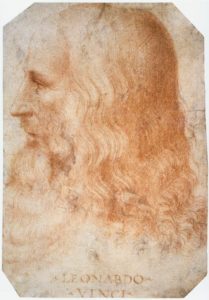 Today is the birthday of Leonardo da Vinci (Leonardo di ser Piero da Vinci, Vinci 15 April 1452 – 2 May 1519 Amboise, Kingdom of France); polymath whose areas of interest included invention, painting, sculpting, architecture, science, music, mathematics, engineering, literature, anatomy, geology, astronomy, botany, writing, history, and cartography. He has been called the father of paleontology, ichnology, and architecture, and is widely considered one of the greatest painters of all time. His genius epitomized the Renaissance humanist ideal.
Today is the birthday of Leonardo da Vinci (Leonardo di ser Piero da Vinci, Vinci 15 April 1452 – 2 May 1519 Amboise, Kingdom of France); polymath whose areas of interest included invention, painting, sculpting, architecture, science, music, mathematics, engineering, literature, anatomy, geology, astronomy, botany, writing, history, and cartography. He has been called the father of paleontology, ichnology, and architecture, and is widely considered one of the greatest painters of all time. His genius epitomized the Renaissance humanist ideal.
Beyond friendship, Leonardo kept his private life secret. His sexuality has been the subject of satire, analysis, and speculation. This trend began in the mid-16th century and was revived in the 19th and 20th centuries, most notably by Sigmund Freud. Leonardo’s most intimate relationships were perhaps with his pupils Salai and Melzi. Melzi, writing to inform Leonardo’s brothers of his death, described Leonardo’s feelings for his pupils as both loving and passionate. It has been claimed since the 16th century that these relationships were of a sexual or erotic nature. Court records of 1476, when he was aged twenty-four, show that Leonardo and three other young men were charged with sodomy in an incident involving a well-known male prostitute. The charges were dismissed for lack of evidence, and there is speculation that since one of the accused, Lionardo de Tornabuoni, was related to Lorenzo de’ Medici, the family exerted its influence to secure the dismissal. Since that date much has been written about his presumed homosexuality and its role in his art, particularly in the androgyny and eroticism manifested in John the Baptist and Bacchus and more explicitly in a number of erotic drawings.
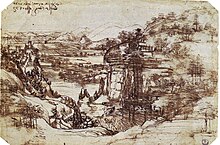
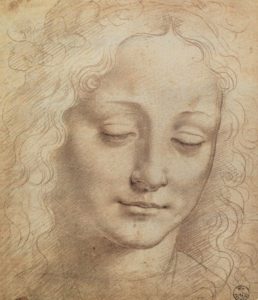








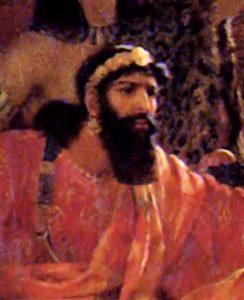 On this day in 1738 – Serse, an Italian opera by George Frideric Handel receives its premiere performance in London, England. It is an opera seria in three acts. The Italian libretto was adapted by an unknown hand from that by Silvio Stampiglia for an earlier opera of the same name by Giovanni Bononcini in 1694. Stampiglia’s libretto was itself based on one by Nicolò Minato that was set by Francesco Cavalli in 1654. The opera is set in Persia (modern-day Iran) in 480 BC and is very loosely based upon Xerxes I of Persia, though there is little in either the libretto or music that is relevant to that setting. Serse, originally sung by a castrato, is now usually performed by a mezzo-soprano, contralto or countertenor. The opening aria, “Ombra mai fu”, sung by Xerxes to a plane tree (Platanus orientalis). Ombra is the Italian word for shade, as in shade tree. In the writings of the Greek historian Herodotus, Xerxes is depicted as an all-powerful despot, whose every whim became law. As evidence of the irrational effect of absolute power, Herodotus tells of Xerxes’ fondness for a certain plane tree that he ordered decorated with gold ornaments and put under perpetual military guard as a sign of royal favor. In Handel’s opera, the famous “Largo” is actually Xerxes’s dreamy song to this famous tree-and the “shade” referred to is the sort to be found under its gold-bedecked branches. It is set to one of Handel’s best-known melodies, and is often known as Handel’s “Largo” (despite being marked “larghetto” in the score).
On this day in 1738 – Serse, an Italian opera by George Frideric Handel receives its premiere performance in London, England. It is an opera seria in three acts. The Italian libretto was adapted by an unknown hand from that by Silvio Stampiglia for an earlier opera of the same name by Giovanni Bononcini in 1694. Stampiglia’s libretto was itself based on one by Nicolò Minato that was set by Francesco Cavalli in 1654. The opera is set in Persia (modern-day Iran) in 480 BC and is very loosely based upon Xerxes I of Persia, though there is little in either the libretto or music that is relevant to that setting. Serse, originally sung by a castrato, is now usually performed by a mezzo-soprano, contralto or countertenor. The opening aria, “Ombra mai fu”, sung by Xerxes to a plane tree (Platanus orientalis). Ombra is the Italian word for shade, as in shade tree. In the writings of the Greek historian Herodotus, Xerxes is depicted as an all-powerful despot, whose every whim became law. As evidence of the irrational effect of absolute power, Herodotus tells of Xerxes’ fondness for a certain plane tree that he ordered decorated with gold ornaments and put under perpetual military guard as a sign of royal favor. In Handel’s opera, the famous “Largo” is actually Xerxes’s dreamy song to this famous tree-and the “shade” referred to is the sort to be found under its gold-bedecked branches. It is set to one of Handel’s best-known melodies, and is often known as Handel’s “Largo” (despite being marked “larghetto” in the score).
| Henry James | |
|---|---|

James in 1910
|
|
Today is the birthday of Henry James, OM (New York City, 15 April 1843 – 28 February 1916 Cheyne Walk, Chelsea, London); author regarded as a key transitional figure between literary realism and literary modernism, and in my opinion, is one of the greatest novelists in the English language. He was the son of Henry James Sr. and the brother of renowned philosopher and psychologist William James and diarist Alice James.
Perhaps best known for a number of novels dealing with the social and marital interplay between emigre Americans, English people, and continental Europeans – examples of such novels include The Portrait of a Lady, The Ambassadors, and The Wings of the Dove. His later works were increasingly experimental. For their unique ambiguity, as well as for other aspects of their composition, his late works have been compared to impressionist painting.
In addition to voluminous works of fiction, James published articles and books of criticism, travel, biography, autobiography, and plays. Born in the United States, James largely relocated to Europe as a young man and eventually settled in England, becoming a British subject in 1915, one year before his death. James was nominated for the Nobel Prize in Literature in 1911, 1912, and 1916.


As he requested, his ashes were buried in Cambridge Cemetery in Massachusetts.
James regularly rejected suggestions that he should marry, and after settling in London proclaimed himself “a bachelor”. Biographers have speculated that James had been in love with his cousin Mary (“Minnie”) Temple, but that a neurotic fear of sex kept him from admitting such affections. As more material became available to scholars, including the diaries of contemporaries and hundreds of affectionate and sometimes erotic letters written by James to younger men, the picture of neurotic celibacy gave way to a portrait of a closeted homosexual. Another portrayal of James includes the suggestion that he was celibate.



The Portrait of a Lady (1881)
- Mrs Touchett was certainly a person of many oddities, of which her behaviour on returning to her husband’s house after many months was a noticeable specimen. She had her own way of doing all that she did, and this is the simplest description of a character which, although by no means without liberal motions, rarely succeeded in giving an impression of suavity.
- Ch. III.
- Mr Touchett used to think that she reminded him of his wife when his wife was in her teens. It was because she was fresh and natural and quick to understand, to speak – so many characteristics of her niece – that he had fallen in love with Mrs Touchett.
- Ch. VI.
- She had promised him she would consider his question [of marrying him] […]. But this was not the case; she was wondering if she were not a cold, hard, priggish person, and, on her at last getting up and going rather quickly back to the house, felt, as she had said to her friend, really frightened at herself.
- Ch. XII.
- There’s no more usual basis of union than a mutual misunderstanding.
- Ch. XV.
- “If I should cease to think of you at all for a prescribed time, I should find I could keep it up indefinitely. […] You know that what you ask is impossible […] I’m capable of nothing with regard to you,” he went on, “but just of being infernally in love with you. If one’s strong one loves only the more strongly.”
- Ch. XVI.
- Besides, I try to judge things for myself; to judge wrong, I think, is more honourable than not to judge at all.
- Ch. XVI.
- She often wondered indeed if she ever had been, or ever could be, intimate with anyone. She had an ideal of friendship as well as of several other sentiments, which it failed to seem to her in this case – it had not seemed to her in other cases – that the actual completely expressed.
- Ch. XIX.
- “I don’t pretend to know what people are meant for,” said Madame Merle. “I only know what I can do with them.”
- Ch. XXII.
- To live in such a place was, for Isabel, to hold to her ear all day a shell of the sea of the past. This vague eternal rumour kept her imagination awake.
- Ch. XXIII.
- Don’t mind anything anyone tells you about anyone else. Judge everyone and everything for yourself.
- Ch. XXIII.
- The working of this young lady’s spirit was strange, and I can only give it to you as I see it, not hoping to make it seem altogether natural.
- Ch. XXIX
- She gave an envious thought to the happier lot of men, who are always free to plunge into the healing waters of action.
- Ch. XXXVIII
- She could never rid herself of the sense that unhappiness was a state of disease – of suffering as opposed to doing. To “do” – it hardly mattered what – would therefore be an escape, perhaps in some degree a remedy.
- Ch. XLI
- The real offence, as she ultimately perceived, was her having a mind of her own at all. Her mind was to be his — attached to his own like a small garden-plot to a deer-park.
- Ch. XLII.
- You wanted to look at life for yourself — but you were not allowed; you were punished for your wish. You were ground in the very mill of the conventional!
- Ch. LIV.
- Here she drew forth a small pocket-book, took from it a card and a pencil and, after meditating a moment, wrote a few words. It is our privilege to look over her shoulder, and if we exercise it we may read the brief query: […].
- XLIV
- What he thought of her she knew, what he was capable of saying to her she had felt; yet they were married, for all that, and marriage meant that a woman should cleave to the man with whom, uttering tremendous vows, she had stood at the altar.
- Ch. LI
Today is the birthday of Thomas Hart Benton (Neosho, Missouri April 15, 1889 – January 19, 1975 Kansas City, Missouri); painter and muralist. Along with Grant Wood and John Steuart Curry, he was at the forefront of the Regionalist art movement. His fluid, sculpted figures in his paintings showed everyday people in scenes of life in the United States. Though his work is strongly associated with the Midwestern United States, he studied in Paris, lived in New York City for more than 20 years and painted scores of works there, summered for 50 years on Martha’s Vineyard off the New England coast, and also painted scenes of the American South and West.

Benton in 1935
|
|
Gallery
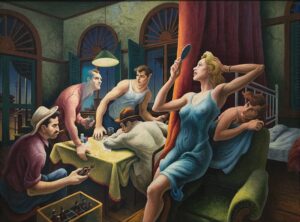
A Streetcar Named Desire
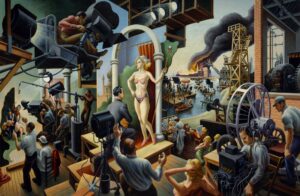
Hollywood
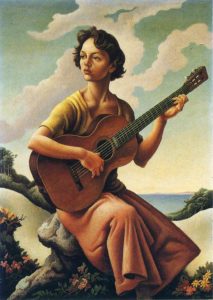
Jessie with guitar



Mac Tag

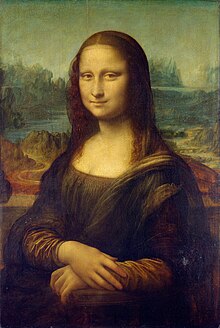




No Comments on "The Lovers’ Chronicle 15 April – consider – birth of Leonardo da Vinci & Henry James – premiere of Handel’s Serse – art by Thomas Hart Benton"